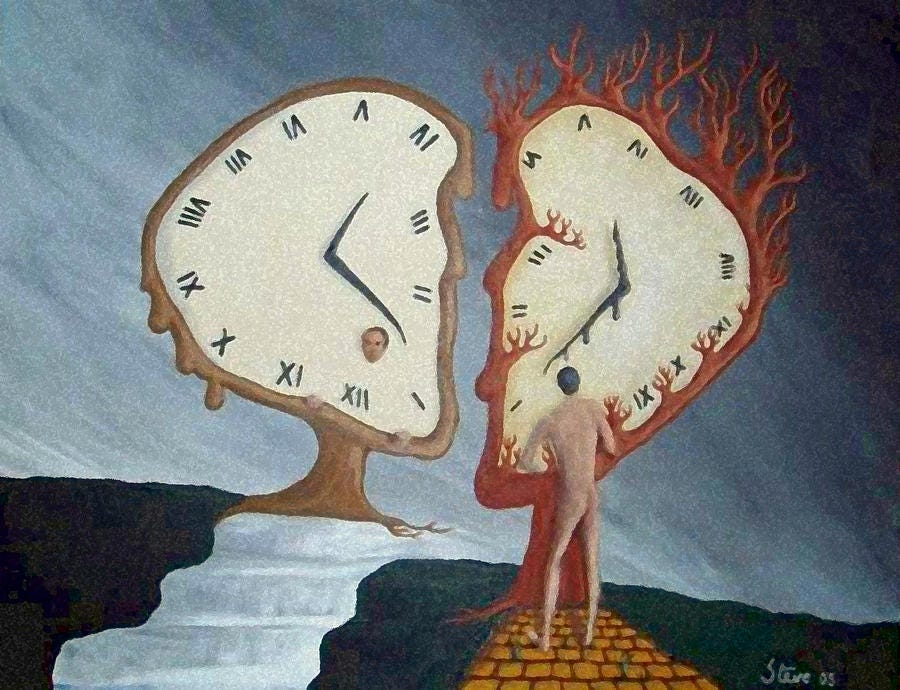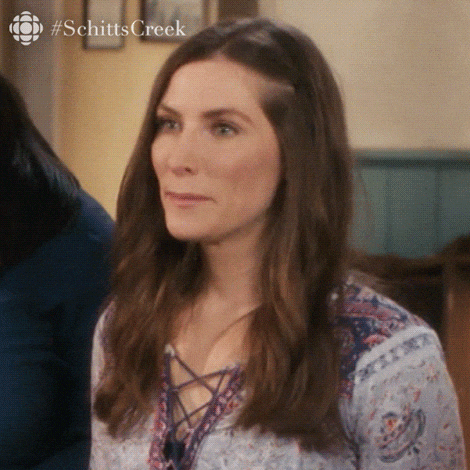Well. I took a summer read too far, and I have no chill about it. Like, at all. Let me explain.
Back in June, I bought a bunch of new literary fiction releases that looked like possible fun beach reads, and one of them was called The Ministry of Time by Kaliane Bradley. It was one of those very buzzy debut novels listed everywhere as a must-read, so I caved and added it to the list.

But before we dive in, let’s take a step back in time for a moment.
As a kid, I was the kind of reader who got way too into whatever book I read and enjoyed. I was what other people would call “voracious,” but what I remember as “obsessive” in a tender sort of way. Rereading books that spoke to me and lit a fire in me was a regular occurrence. I would lecture other people’s ears off about said books in the hopes that maybe, just maybe, I could force them into reading and liking what spoke to me so deeply. Sometimes this worked. Most of the time, though, it just reminded everyone of what an earnest little weirdo {affectionate} I was.
But those obsessions over certain books were shelters I took comfort in. In those shelters, I could revisit characters and chapters and language that excited me, all by myself. No one else had to love it like I did. I could create my own little film of that book, complete with casting and soundtrack. It was, in other words, a way to spur daydream and disassociation when outside forces were tough or confusing.
Now that you know all of that about adolescent Sarah, just know that adult Sarah can’t remember the last time she reread a book no matter how much she loved it. The “to be read” list is just too long. Revisiting passages of a book I just finished? When there are so many famous pieces of literature I haven’t read yet that I’m embarrassed to admit I have avoided up until now? Who has time for that?
This particular vein of passionate, obsessive love for a book is something that has, slowly, over time, collapsed. Blame college literature courses, or the capitalist grind of American adulthood, or being a writer who knows how the proverbial pie crust is made. Or blame growing up and the flattening of big feelings that goes along with it.
I’ve spent a lot of time lately judging what brings me joy. Which is a waste. All of this despite the fact that my general stance on reading is that there is no bad literature. There’s literature I may not agree with, or that may not be my taste, or that doesn’t work for me. But reading is a sacred activity we can, and should, all have access to (call me Pollyanna).
And I don’t care what other people read, so long as they read something. Romance, beach reads, graphic novels, aerospace engineering textbooks, airport fiction, DVD player instruction manual, Twilight, fan fiction, whatever—I genuinely don’t give a shit as long as you’re reading.
But of course I judge my own taste sometimes. I judge my own taste far more than I judge the taste of others.
The Ministry of Time is one of those books that, when you try to summarize it in one sentence, sounds like both a parody of itself and a fever dream. But I’ll do my best here.
The book is told primarily from the perspective of an unnamed protagonist who works as a civil servant for the British government. And, in typical shady government fashion, they have initiated a highly classified time travel experiment. Using a time travel “door,” real people from Britain’s past are captured and forced to live in the present day. The protagonist, a young British-Cambodian woman who passes as white, is assigned to live with a strikingly handsome naval officer who was part of an ill-fated Victorian polar expedition during the 1840s before his “capture” (this officer character, Graham Gore, is very loosely based off a real guy who disappeared in the Arctic during Franklin’s expedition). As with all secret government projects, of course, not all is as it seems in this experiment, which both the protagonist and her naval officer slowly begin to realize.
This description does the book justice but also it doesn’t. Time travel, it turns out, takes a lot of forms. And the narrator, though charmingly honest, is hardly reliable. But who really likes a reliable narrator anyway? They are overrated (which I write as someone who considers herself an unreliable narrator).

It is a book that’s equal parts funny and smart, sensual and heartbreaking. Even before I read any interviews with novel’s author, Kaliane Bradley, I could sense just how fun she had writing it. Despite the fun, it is also sneakily about larger questions surrounding complicity and power; legacies of colonialism and racism; and how to square the values of the past with the ones we hold today when trying to create a better future. There is something so profoundly joyful about a novel that takes me by surprise with how simultaneously profound and intelligent and goofy it can be all at once.
Plus, there is also something deeply satisfying about inhaling a book I know would have been eviscerated in my MFA writing program by folks who unironically said things like “plot is overrated” and “I don’t read commercial fiction.”
Because how wildly special, to find a book that makes me light up on the inside and reminds me of how alive I am, as books once did when I was a teenager. Even if said book does feel suspiciously like a guilty pleasure. Because what is there to feel guilty about, exactly?
Truthfully I can’t entirely articulate yet what exactly makes The Ministry of Time a guilty pleasure for me, if it truly is one at all. It is a smart, well-written novel (though certainly not perfect, particularly the last third’s structure/pacing and a few small plot holes).
Is it that it’s a page turner? Is it the romance? The espionage subplot, which is usually a turn off for me? Is it how much the book made me laugh out loud like one of those little illustrated gremlins you’d find on the margins of a medieval manuscript?
As a writer, sometimes it feels as if everything I read should be Very Serious Business that should Influence My Work or Be an Urgent Read and Contribute to the Literary Cannon. And yet, there was a pleasure in going back to reread sections of this book that were especially hilarious or romantic or just honest-to-god gorgeously written.
Now, it could very easily be argued that there are some things going on for me personally (which I won’t get into here) that have necessitated disassociation. Yet I suspect that one source of my guilty pleasure is just how much satisfaction the book gave me; how its residue stuck to me long after it was done.
After all, I felt a sharp buzz when reading people’s reviews of the book online, particularly those who did not agree with me (listen, we’re all allowed to be extremely wrong sometimes). I experienced a mischievous delight when anonymously arguing with people online about who should be cast in the upcoming BBC/A24 limited series adaptation of the book (why yes, I will be absolutely insufferable when this comes out). And let’s not forget the joy of gushing to all my friends that I need them to read this book and talk to me about it even if they hate it because I am alone in knowing this narrative (aside from my online frenemies) and I really wish I wasn’t.
The book has consumed me. And the fact that I, a Very Adult Woman in her Mid-30s and Writer of Serious Things Sometimes, could be caught up by something like this, in the way I might have back when I was a kid, has shocked me. Specifically, the way it amplified my already bountiful emotions while reading in the way more books did when I was a teenager. It’s really not so different from when I swooned and obsessed over Harry Potter books as a kid, or Sarah Dessen books as a teen. In the best way.
Perhaps the “guilty” part of the “guilty pleasure” here is just how earnestly delighted The Ministry of Time made me. And I know that too much earnestness without self-awareness can sometimes evolve into cringe (if you want to watch someone far smarter than I could ever hope to be talk about “cringe” as a concept, I highly recommend you watch the video in the link).
And cringe, unlike hope, is not a thing with feathers. It is instead the thing that draws the thoughts and feelings of others dreadfully close, worryingly close even, as I delve further into the quicksand of obsession. In other words, cringe invites heightened self-awareness and fear of judgement and—worst of all—shame.
It’s been ages since I felt so earnestly excited about something that is so transparently escapist, and it is hard to know what to do with that energy. That pleasure feels unearned on my part somehow, or maybe just uncomfortable because I’m out of practice. It’s as if, perhaps, I was allowed a moment to time travel emotionally back to when I regularly did feel so earnestly excited about the books that wowed me. It has allowed me to experience a shred of time travel for myself. The difference between the time travel I experienced and the time travel in the book is that, unlike Graham Gore, I can slip back to my present day feelings and self (my “home era,” if you will) with ease.
That doesn’t come without its own problems of course. Like the folks captured from Britain’s past, not everything that travels forward in time translates into a new era seamlessly. Adult joy and adolescent joy are distant cousins. But perhaps its just that I get to experience a shred of time travel to a younger version of my emotional self that is the biggest guilty pleasure in all of this, however fleeting. And taking some joy in that has been just the break I needed.

Fear not, my dear Nervous Wrecks. I am channelling this energy productively. Into my writing projects, which are big and thrilling and terrifying and all consuming, not unlike a Victorian polar expedition. Into thinking about colonialism in an entirely new way. Into writing this newsletter you’re reading right now (thanks for being here, btw).
It’s also a nice reminder that a book does not need to be MFA and Iowa-Workshop-approved in order to be a source of energy and passion, delight and wonder. While I know that intellectually, I’ve had to come to terms with that emotionally, for myself. And this was a pleasant reminder, which I need when I am writing my own creative work which often feels too ambitious, too weird, too hard to explain in a sentence or two. A reader, when brought into a narrative in the right way, can make room for all kinds of expansive imagination.
I know I certainly did.
PPS From what I can gather Kaliane Bradley doesn’t have social media, otherwise I’d link that here. But if one of my followers magically has a connection to her, can you please tell her what the book has meant for me?
(Hell, nothing about this entire newsletter is chill, so why should the ending of it be any different?)






sold. convinced. ordering it now.